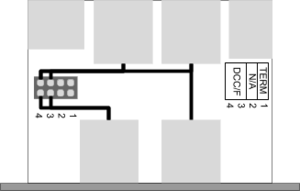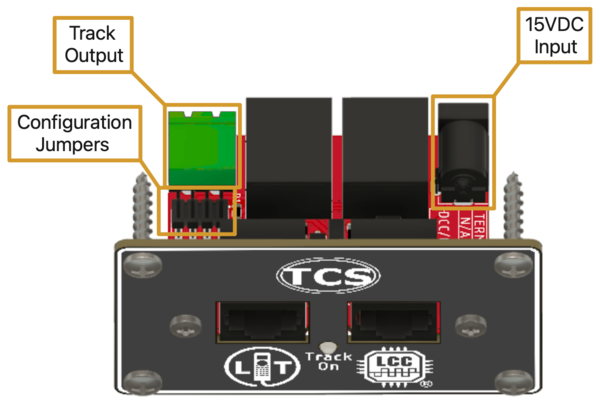LT Panel: Difference between revisions
mNo edit summary |
m (description) |
||
| (11 intermediate revisions by 2 users not shown) | |||
| Line 2: | Line 2: | ||
[[Category:Command System]] | [[Category:Command System]] | ||
[[Category:LCC Device]] | [[Category:LCC Device]] | ||
{{Infobox throttle | {{Infobox throttle | ||
| Manufacturer=Train Control Systems | | Manufacturer=Train Control Systems | ||
| Line 13: | Line 11: | ||
| image=LT Panel.png}} | | image=LT Panel.png}} | ||
<p>The LT Panel is the same fascia panel assembly which comes included with the LT-50.</p> | <p>The LT Panel is the same fascia panel assembly which comes included with the [[LT-50]].</p> | ||
<p>This product is used with the [[LT-50]] "Layout Throttle." This panel can be used to create a DCC track output when used with an [[LT-50]] using the specified jack. A single additional wired LCC throttle can be connected to the front of the panel, and this panel can be connected into a larger LCC network using the jacks on the back. </p> | |||
<p>The LT Panel can also be used as a power injection point for an LCC network (400mA per port) when used with an appropriate power supply (not included, except with the [[LT-50]]) and the barrel jack on the back.</p> | |||
===Included In Package=== | |||
*LT Panel board x1 | |||
*LT Panel fascia cover plate x1 | |||
*Fascia mounting screws x4 | |||
*Fascia cover plate screws x2 | |||
*Option Jumpers x3 | |||
===Physical Overview=== | |||
The LT Panel has a few notable physical features: | |||
#Green 2-pin Track Output connector with detachable screw terminal connector | |||
#2.5mm x 5.5mm barrel jack for Power In | |||
#Configuration Jumpers (see details below) | |||
#Single "LT" RJ-45 jack(for LT-50 only) | |||
#Three "LCC" RJ-45 jacks (1x Front: For T-50; 2x Rear for LCC Bus) | |||
#Bi-color LED for "Track On" | |||
[[File:LT Panel (2).png|frameless|600x600px]] | |||
===Configuration Jumpers=== | |||
Refer to the table below for information on the configuration jumpers available on the LT Panel: | |||
{| class="wikitable" | |||
!Jumper Position | |||
!Description | |||
|- | |||
|TERM (1) | |||
|Insert this jumper to add termination to the LCC-CAN bus. An LCC-CAN bus should have exactly two terminators, with one at each end of the bus. | |||
This jumper can (optionally) provide for one of the required terminators. | |||
''Note: In practicality, a very short (less than 10ft or 3m) LCC-CAN bus can still work reliably with one terminator.'' | |||
|- | |||
|N/A (2) | |||
|''Not Used'' | |||
|- | |||
|DCC/F (3 & 4) | |||
|The LT Panel is designed to be use with a "Layout Throttle", such as an LT-50 plugged into the front facing port with the "LT" logo. [[File:DCC-F Simplified Diagram.png|thumb|300x300px|Simplified diagram showing the electrical connection for DCC/F jumpers.]]Insert these two jumpers to pass the low power DCC signals from the Layout Throttle through to the other three LCC jacks (pins 4 & 5 of the LCC-CAN standard). Remove these jumpers to disconnect the low power DCC signals provided by the Layout Throttle. | |||
''Note: The Layout Throttle uses the [https://www.nmra.org/sites/default/files/standards/sandrp/pdf/s-9.1.2_power_station_interface.pdf NMRA S-9.1.2 Full Scale Interface]'' | |||
DCC/F is a low-power mirror of the track output from the command station (in this case, the [[LT-50]]). | |||
This circuit is only intended to be used to provide the signal '''from''' the LT-50 '''to''' other devices on the LCC-CAN bus. This circuit is '''not''' intended to supply signals to LCC boosters such as the B-106. This circuit '''must be disabled/open''' if another LCC device is driving the LCC-CAN pins 4 & 5 as allowed by the standard. The '''LT''' Panel is not designed to be used along with another LCC/DCC command station, such as the CS-105. In this case, an '''LCC''' Panel should be used instead. | |||
|} | |||
Latest revision as of 22:31, 28 December 2022
Lua error: Internal error: The interpreter exited with status 1.
The LT Panel is the same fascia panel assembly which comes included with the LT-50.
This product is used with the LT-50 "Layout Throttle." This panel can be used to create a DCC track output when used with an LT-50 using the specified jack. A single additional wired LCC throttle can be connected to the front of the panel, and this panel can be connected into a larger LCC network using the jacks on the back.
The LT Panel can also be used as a power injection point for an LCC network (400mA per port) when used with an appropriate power supply (not included, except with the LT-50) and the barrel jack on the back.
Included In Package
- LT Panel board x1
- LT Panel fascia cover plate x1
- Fascia mounting screws x4
- Fascia cover plate screws x2
- Option Jumpers x3
Physical Overview
The LT Panel has a few notable physical features:
- Green 2-pin Track Output connector with detachable screw terminal connector
- 2.5mm x 5.5mm barrel jack for Power In
- Configuration Jumpers (see details below)
- Single "LT" RJ-45 jack(for LT-50 only)
- Three "LCC" RJ-45 jacks (1x Front: For T-50; 2x Rear for LCC Bus)
- Bi-color LED for "Track On"
Configuration Jumpers
Refer to the table below for information on the configuration jumpers available on the LT Panel:
| Jumper Position | Description |
|---|---|
| TERM (1) | Insert this jumper to add termination to the LCC-CAN bus. An LCC-CAN bus should have exactly two terminators, with one at each end of the bus.
This jumper can (optionally) provide for one of the required terminators. Note: In practicality, a very short (less than 10ft or 3m) LCC-CAN bus can still work reliably with one terminator. |
| N/A (2) | Not Used |
| DCC/F (3 & 4) | The LT Panel is designed to be use with a "Layout Throttle", such as an LT-50 plugged into the front facing port with the "LT" logo.  Note: The Layout Throttle uses the NMRA S-9.1.2 Full Scale Interface
This circuit is only intended to be used to provide the signal from the LT-50 to other devices on the LCC-CAN bus. This circuit is not intended to supply signals to LCC boosters such as the B-106. This circuit must be disabled/open if another LCC device is driving the LCC-CAN pins 4 & 5 as allowed by the standard. The LT Panel is not designed to be used along with another LCC/DCC command station, such as the CS-105. In this case, an LCC Panel should be used instead. |
